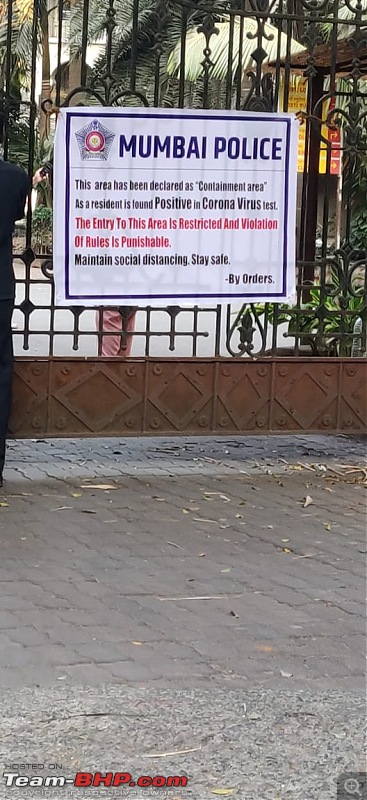Quote:
Originally Posted by vsathyap  Can the experts and doctors advise on how to handle groceries and vegetables, fruits, flowers, green leafy vegetables, etc? These things pass through a lot of hands before they make their way into our homes. Will a simple cold water wash suffice for vegetable and fruit? What about packed stuff like biscuits chips etc? What if someone with covid has coughed or sneezed on these items? |
There is no specific advisory or evidence regarding food borne transmission in my knowledge. My advise would be to wash all vegetables, fruits, flowers, green leafy vegetables in running water. Keep a separate utensil ready, wash your hands with soap and water, then start washing the fruits, vegetables and transfer washed ones in the separate utensil. This is what I am doing.
For packed items such as biscuits, chips, fruit cakes, the paranoid me is washing them gently with small amount of soap and water (for real) while they are still sealed. No water or soap goes inside.

Be advised, soap must not come in contact with food items. Also, I am careful in selecting the food packets as I do not buy the ones that have a flimsy packing or if the packing seems compromised as it will not allow me to wash such packets.
Quote:
Originally Posted by vibbs  Doc, my heart sank the moment I read that post! Wonder how many people could be infected by this one guy. He was quarantined but his family members were not!
:(
My worry for my parents and family back in India grows. More so since I am not with them! |
Its good not to read too much about individual cases. Everything will be fine soon and our lives will be back to normal. Do not stress about what is not in our hands but focus on things that are in our control (social distancing, general precautions etc.)
Quote:
Originally Posted by AZT  Some questions regarding this:
1. Do we have any clarity on how long an asymptomatic person can be contagious.
2. Since most people develop immunity to this, are you still contagious after developing the immunity.
3. Is it possible for a person to test negative on say day 7 but test positive on day 14, is there any time period for which you need to be infected for it to show on the test. |
Answer 1: There is no information regarding this on CDC website. The following is what they mention as of now:
"
The onset and duration of viral shedding and the period of infectiousness for COVID-19 are not yet known. It is possible that SARS-CoV-2 RNA may be detectable in the upper or lower respiratory tract for weeks after illness onset, similar to infections with MERS-CoV and SARS-CoV. However, detection of viral RNA does not necessarily mean that infectious virus is present. There are reports of asymptomatic infections (detection of virus with no development of symptoms) and pre-symptomatic infections (detection of virus prior to development of symptoms) with SARS-CoV-2, but their role in transmission is not yet known. Based on existing literature, the incubation period (the time from exposure to development of symptoms) of SARS-CoV-2 and other coronaviruses (e.g. MERS-CoV, SARS-CoV) ranges from 2–14 days."
https://www.cdc.gov/coronavirus/2019-ncov/hcp/faq.html
Answer 2: This is again a tricky question to answer "as of now". I say as of now, because the possibility of re-infections in recovered patients has still not been eliminated by CDC. So answering the duration of infectivity is even more challenging. Normally, by the time a patient develops immunity, the infectivity is reduced to a substantial extent but it is again a complex interaction of the virus and the immune system that can not be generalized to all infectious agents. In context of immunity, I am sharing links to some news articles that are simple enough to comprehend by anyone.
https://abcnews.go.com/Health/immuni...ry?id=69756590 https://www.nationalgeographic.com/s...us-we-need-it/
For a more curious reader who is willing to spend time understanding virus-host interaction in details, this book chapter is relevant:
https://www.ncbi.nlm.nih.gov/books/NBK8423/
Answer 3 (simple explanation): The two commonest methods of detecting a viral infection is either by detecting the virus (or its DNA/RNA) or detecting the antibodies in the body as that is an evidence that the person is/was infected by that virus and thus developed antibodies.
The present method of COVID-19 testing is based on virus detection so it can be detected earlier (it takes time for antibodies to develop and this time frame is variable depending upon the testing method/kit and the dynamics of the virus interaction with the infected host).
Now, to answer your question, it is possible to test negative on day 7 but positive on day 14. This could be attributable to a variety of factors such as: quality of clinical specimen collected, maintenance of cold chain during specimen transport, error in testing, quality of test kit, patient related factors (variability in onset of virus shedding and its numbers in his/her respiratory secretions).
https://theprint.in/india/leh-cab-dr...d-test/385480/
Our current guidelines stated that an asymptomatic person needs to be tested once between day 5 to day 14 after contact.
https://icmr.nic.in/sites/default/fi...19_test_v3.pdf  (1)
Thanks
(1)
Thanks
 (9)
Thanks
(9)
Thanks
 (5)
Thanks
(5)
Thanks
 (4)
Thanks
(4)
Thanks

 (2)
Thanks
(2)
Thanks
 (3)
Thanks
(3)
Thanks

 (7)
Thanks
(7)
Thanks
 (1)
Thanks
(1)
Thanks
 (7)
Thanks
(7)
Thanks

 (8)
Thanks
(8)
Thanks





 Be advised, soap must not come in contact with food items. Also, I am careful in selecting the food packets as I do not buy the ones that have a flimsy packing or if the packing seems compromised as it will not allow me to wash such packets.
Be advised, soap must not come in contact with food items. Also, I am careful in selecting the food packets as I do not buy the ones that have a flimsy packing or if the packing seems compromised as it will not allow me to wash such packets.